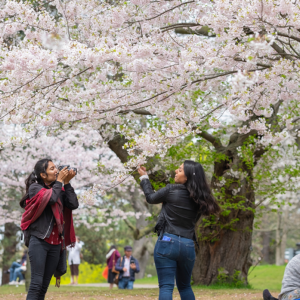Screen Time Vs Green Time: New Report Shows Too Much Screen Time Is Hurting Canada’s Kids
For Immediate Release – Monday, November 26, 2018
Ottawa – A new report released today exposes the negative health impacts excessive screen time is having on Canadian children. Screen Time vs Green Time: The Health Impacts of Too Much Screen Time by Nature Canada outlines the dramatic shift in the way Canadian kids and teens are spending their time today, with both physical and mental health repercussions.
“When our parents told us to go play outside, they were actually giving us great health advice,” says Jill Sturdy, NatureHood Program Manager with Nature Canada. “Unfortunately, today excessive screen use is not only robbing our kids of memories playing in the outdoors, it is hurting our kids’ health.”
Some key findings of the report include
- The vast majority of Canadian children are exceeding the recommended screen time guideline;
- 85% of children aged 5-17 do not meet the guidelines for adequate sleep, physical activity and screen time;
- Adolescents who spent more time on social media and smartphones were more likely to report mental health issues such as anxiety and depression;
- Outdoor play in nature is essential for healthy child development.
“We are seeing a downward trend in the amount of physical activity children are getting in a day as a result of sedentary behaviour linked to screen time,” states Dr. Mark Tremblay, Director of the Healthy Active Living and Obesity Research Group at the CHEO Research Institute in Ottawa, and professor at the University of Ottawa.
“The long-term impacts of excessive screen time, prolonged sedentary behaviour and physical inactivity include increased risk of metabolic and cardiovascular issues, such as type-2 diabetes and heart disease, and time in nature and the outdoors is an easy antidote to these consequences of modern living,” he says.
Excessive screen time is also costing our children sleep, which is essential for healthy development. Electronic devices in bedrooms and excessive digital light exposure late at night are linked to short sleep duration, sleep deprivation and sleep disorders among Canadian children.
Dr. Michael Cheng, a psychiatrist at CHEO and a professor at the University of Ottawa, says he is concerned with the increased demands for mental health services to help with anxiety and depression, and the link to excessive use of screens. In his own practice, Dr. Cheng prescribes nature to help with the epidemic of anxiety and depression.
“Families that spend meaningful time together in nature will rediscover the most powerful anti-depressant – getting outside and connecting with each other,” says Cheng.
The report shows that being active outdoors in nature helps children manage stress, improve moods and reduce anxiety. Along with positive health outcomes, children who spend time in nature are more likely to develop a lifelong love and appreciation for nature.
“The good news here is that the solution to too much screen time is right outside our front doors,” said Sturdy.
Click HERE to read the REPORT.
Click HERE to read the Tip Sheet for parents to reduce screen time and get into nature.
-30-
For more information, please contact:
Haley Ritchie | Communications Specialist, Nature Canada
613-558-0280 (cell)
613 562-3447 ext. 252
hritchie@naturecanada.ca
About Nature Canada:
Nature Canada is the country’s oldest conservation charity and has more than 90,000 members and supporters. Since 1939 the organization has worked to protect 63 million acres of parks and wildlife areas in Canada and countless species that depend on this habitat. For more information go to www.naturecanada.ca



